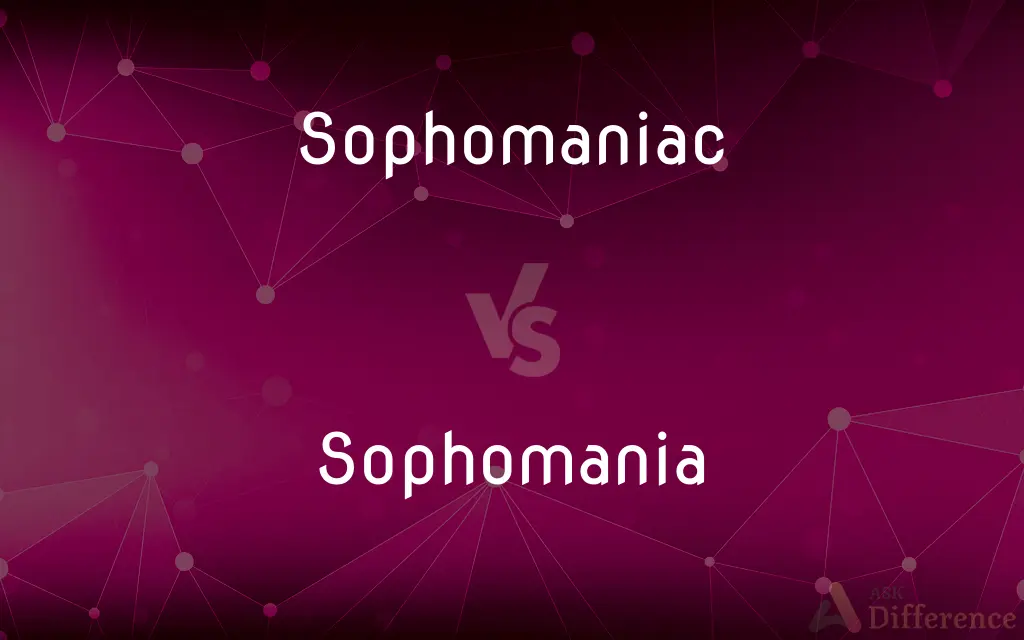Sophomaniac vs. Sophomania — What's the Difference?
By Urooj Arif & Maham Liaqat — Updated on April 27, 2024
Sophomaniac refers to a person with an excessive pride in one's intelligence, while sophomania describes the delusional belief about one's own intelligence.

Difference Between Sophomaniac and Sophomania
Table of Contents
ADVERTISEMENT
Key Differences
A sophomaniac is an individual characterized by an excessive and often unfounded belief in their own intelligence or abilities. Whereas, sophomania is the condition itself, defined as a delusional overestimation of one’s intellectual capabilities.
Sophomaniacs often exhibit behaviors and attitudes reflecting arrogance and self-importance due to their perceived intellectual superiority. On the other hand, sophomania refers to the broader psychological state or syndrome that involves this obsessive or delusional attitude towards one's intelligence.
In psychological contexts, a sophomaniac might be described as suffering from a form of narcissism specifically linked to intelligence. Whereas sophomania could be considered a symptom or manifestation of a psychological disorder affecting one's self-perception.
Sophomaniacs actively display their supposed intellectual superiority, often engaging in complex discussions or debates to showcase their prowess. In contrast, sophomania might not always manifest outwardly but can dominate the internal thought processes of an individual.
Comparison Chart
Definition
A person with an exaggerated pride in their intelligence
The delusional belief about one's own intelligence
ADVERTISEMENT
Manifestation
Behaviorally, in interpersonal interactions
Psychologically, as a state of mind
Relation
Individual level
Condition or syndrome level
Psychological Link
Often linked with narcissistic traits
Considered a psychological condition
Impact
Affects social interactions and perceptions
Affects the individual's mental state and perceptions
Compare with Definitions
Sophomaniac
Characterized by undue confidence in one's mental prowess.
As a sophomaniac, she dismissed all advice on her project.
Sophomania
A psychological syndrome linked to intellectual narcissism.
Her therapist diagnosed her difficult behavior as stemming from sophomania.
Sophomaniac
Exhibits narcissistic intellectual behavior.
The professor’s sophomaniac tendencies made him unpopular among peers.
Sophomania
Can be internal and not always visible.
Despite appearing humble, he suffered from sophomania.
Sophomaniac
Often belittles others’ intellectual contributions.
The sophomaniac in the meeting ignored all opposing viewpoints.
Sophomania
Mental state involving overestimation of one’s intellectual capacity.
Sophomania can isolate individuals from academic peers.
Sophomaniac
A person excessively proud of their intelligence.
The debate club’s sophomaniac often overshadowed others' ideas.
Sophomania
A condition of delusional intelligence.
His sophomania led him to challenge established scientific theories.
Sophomaniac
Someone often delusional about their intellectual capabilities.
He’s a sophomaniac who believes he understands quantum mechanics better than experts.
Sophomania
Requires understanding and possibly psychological help.
Addressing his sophomania was crucial for his personal growth.
Sophomaniac
A person evidencing sophomania.
Sophomania
A delusion of having superior intelligence.
Common Curiosities
What are common traits of a sophomaniac?
Common traits include narcissism, arrogance, a dismissive attitude towards others' intelligence, and a compulsion to dominate intellectual discussions.
How can sophomania affect one’s professional life?
Sophomania can negatively impact professional relationships and career progress by causing overconfidence and poor cooperation with colleagues.
What is the key difference between a sophomaniac and sophomania?
A sophomaniac is a person exhibiting excessive pride in their intelligence, while sophomania is the condition of having delusional beliefs about one's intellectual capabilities.
Can sophomania lead to social problems?
Yes, sophomania can lead to social isolation and conflicts due to the individual's delusional self-perception and behaviors.
Are sophomaniacs aware of their condition?
Often, sophomaniacs may not be fully aware of the extent of their condition without external feedback or psychological intervention.
What kind of social interactions might a sophomaniac engage in?
A sophomaniac might dominate conversations, dismiss others' opinions, and insist on the superiority of their own ideas.
Is sophomania considered a mental illness?
While not a classified mental illness in many diagnostic manuals, it is often viewed as a psychological issue needing attention.
Is there a treatment for sophomania?
Psychological counseling and therapy can help address the underlying issues of sophomania.
How does one identify sophomania in an individual?
It can be identified through consistent overestimation of one's intellectual abilities and frequent dismissal or undervaluing of others' ideas and intelligence.
What should you do if you suspect someone is a sophomaniac?
Engaging them in a respectful dialogue about their behavior or suggesting professional help might be appropriate steps.
Can sophomania coexist with other psychological conditions?
Yes, sophomania can coexist with other narcissistic or delusional disorders, often complicating the psychological landscape of an individual.
Can sophomania affect personal relationships?
Yes, the condition can severely impact personal relationships, leading to conflicts and estrangement due to the affected individual's behavior.
How does society typically respond to sophomaniacs?
Society may respond with irritation, avoidance, or confrontation, depending on the context and severity of the sophomaniac's behavior.
What might be a root cause of sophomania?
Root causes can include underlying self-esteem issues, narcissistic personality traits, or other psychological conditions.
How does sophomania differ from simple confidence in one's intelligence?
Sophomania involves a pathological and delusional overestimation of intelligence, beyond simple confidence or self-assurance.
Share Your Discovery

Previous Comparison
Spelled vs. Spelt
Next Comparison
Meager vs. MeagreAuthor Spotlight
Written by
Urooj ArifUrooj is a skilled content writer at Ask Difference, known for her exceptional ability to simplify complex topics into engaging and informative content. With a passion for research and a flair for clear, concise writing, she consistently delivers articles that resonate with our diverse audience.
Co-written by
Maham Liaqat















































